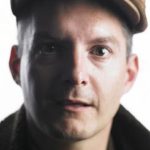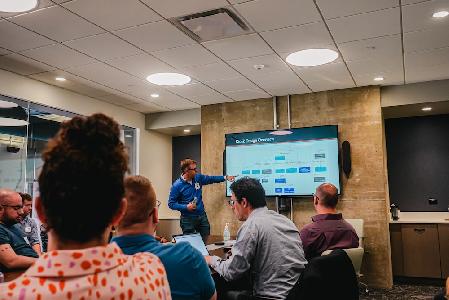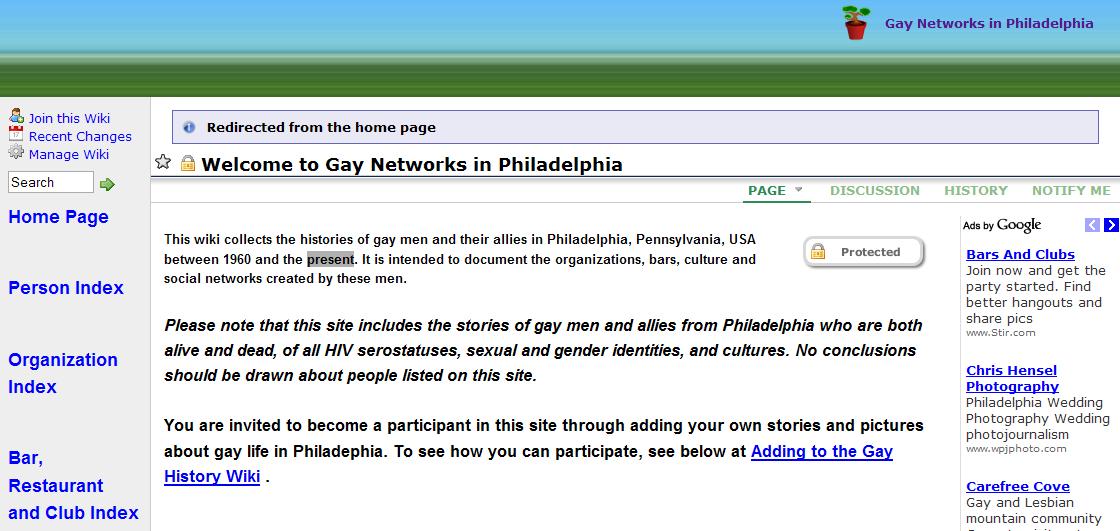
The site, at the moment, is awfully ugly.
“A Web site for dead people shouldn’t be too fancy,” says Chris Bartlett.
That proclamation was met with laughs from an engaged audience of 200 or more during his presentation at Ignite Philly 4 earlier this month, video of which can be seen below. But that five-minute presentation was a bridge from 20 years in a community, three years of research and the nearly half-century old Philadelphia gay community.
Bartlett, 43, is the founder of the Gay History Wiki, which aims to collect the life stories of at least 4,600 gay Philadelphia men who since 1981 have died following complications to their battles with AIDS/HIV and the friends and places who helped develop one of the country’s richest LGBT traditions since the 1960s.
The profiles are notably and purposefully varied, showing the lack of order the AIDS epidemic of the 1980s followed, Bartlett says, from a 31-year-old deli clerk at the Bellvue Stratford hotel to a fashion designer with growing clout to who just might be Kensington’s most famous drag queen and a driving force in driving Bartlett’s passion for the project.
In June 1992, Dominic Bash, a “flamboyant, fiery and fierce” native of the embattled riverward neighborhood and graduate of its Northeast Catholic High School, led the city’s Lesbian and Gay Pride Parade, according to the Inquirer, “strutting from Rittenhouse Square to Penn’s Landing in a purple-and-pink sequined leotard and a lavender feathered boa.”

Somewhere behind him trailed a skinny activist in his mid-20s, wearing a T-shirt and bushy brown hair. That was Bartlett, of course, pictured then at right with Bash, by then a well-known South Street hairdresser, on Penn’s Landing a lifetime ago.
“He was tortured in his neighborhood, but Dominic fought back in ways that were still humanitarian. When a neighborhood bully would pick on him, Dominic would beat up the kid’s bike with a broom,” Bartlett says, returning to a tale touched upon during his Ignite presentation. “The lesson from that is the way to confront hatred is not to beat up on people but the institutions and culture that create those kinds of people.”
“He was really a gay guy. He really had AIDSs. He was really Catholic, and he celebrated all of that with no shame,” Bartlett says. “So when he was really angry at the Catholic Church for being dismissive of gays, Dominic would go to the Cathedral [Basilica of Saints Peter and Paul] on the Parkway and wait for Cardinal Bevilacqua to give him condoms and talk to him about sex education.”
“These are the kinds of stories that we just can’t lose,” Bartlett says. But, he adds, since he first started developing the idea in 2005, he is fast reaching the limitations of his knowledge, experience and time.
So he has taken to finding help. Below watch his Ignite presentation.
http://www.viddler.com/player/edbfdd99/
HOW THE SITE DEVELOPED
Bartlett watched what Stephen Speilberg did with his Shoah Project, capturing memories and stories from those who experienced the Holocaust.
It was about capturing those memories for the future.
In 2005, Bartlett hit the streets and spent the next two years collecting the name of every Philadelphia gay man who died after being diagnosed with HIV/AIDS. He went through records at the Rectory of St. Luke and the Epiphany, the church at 330 S. 13th Street that, under the leadership of Rev. Roger Broadley, took on the burden of the AIDS stigma.
“They buried the people no one else would bury,” Bartlett says. “They were responsible for shepherding 100s of gay men through a dying process that had dignity. That’s all lost if we don’t record this.”
- Contact founder Chris Bartlett
- @harveymilk
- bartlett.cd@gmail.com
By 2007, Bartlett began compiling what he found on wikispaces, the free portal that would allow anyone to add their own memories or other names that Bartlett missed.
Bartlett spoke to community groups, from social clubs to religious services to softball leagues, searched obituaries and the AIDS quilt memorial for Philadelphia ties, trying to create a comprehensive list of deaths.� Bartlett has yet to explore the city’s voluminous and cumbersome archives. He has also collected stories to include on people’s pages, but too many remain barren of the humanizing he wants to embody this project.
“Learning about our dead people is incredibly important because they’ve done everything we’re doing now, just maybe in a different version,” he says. “If we ignore that, a lot of learning is lost.”
It’s functionally outdated, but that doesn’t mean power can’t rise from the top. Bartlett insisted on listing all the names he found on a single page. Scroll through knowing most are the names of people and lives lost and relationships fractured, a great many lost in a time of fear and uncertainty among gay communities in the 1980s.
THE SITE’S FUTURE
He still finds that people discover the site from a search engine result of a friend’s name, but too many, Bartlett fears, are turned off from adding to the wiki because “the site simply isn’t intuitive.” Five to 10 percent of users add or attempt to add to the site, he says.
So he’s looking for partners in developing the platform and incorporating a variety of valuable tool, including a way to streamline the addition process, beautifying the site and increasing the site’s contents. Bartlett says foundation support could help that growth. He has already received $7,500 from the Calamus Foundation to support the development of the wiki and its use as a community organizing tool.
“American culture has become almost ruthlessly individually focused at the expense of community,” he says. “We could use some sense of community.”
By the mid-1990s, a crush of new drugs effectively calmed the rate of AIDS-related casualties in this country, Bartlett says, so most LGBT community members who weren’t already in their 20s by then might likely have missed the pain of losing so many friends to such a scary and, at the time misunderstood, plague.
He wants to take the site national, and then perhaps international, using Philadelphia as a pilot. Bartlett says he wants to make sure these stories and what AIDS meant to the American gay community in the 1980s an early 1990s are not lost, perhaps the site can have a mentorship program partnering young gay men with those who survived the scare.
“The AIDS quilt started in San Francisco and grew because of its simplicity and power,” Bartlett says. “If the architecture of this site could mirror that, why wouldn’t this take off?”
HOW BARTLETT GOT HERE
 Born in Chestnut Hill Hospital but raised in Cheltenham, Bartlett was destined for a professorship, undergraduate at Brown University to study the classics of Latin and Greek and graduate work at Oxford, but he returned home to Philadelphia in 1991 and something happened.
Born in Chestnut Hill Hospital but raised in Cheltenham, Bartlett was destined for a professorship, undergraduate at Brown University to study the classics of Latin and Greek and graduate work at Oxford, but he returned home to Philadelphia in 1991 and something happened.
“I just had this call to activism,” he says. He started running around with Philadelphia’s LGBT social movement, trying to increase the delivery and education of condoms in schools, fighting down AIDS-drug prices and lobbying the dispersal of clean needles to drug users.
“I found then that a regular commitment to homework and hell raising can really make an impact,” says Bartlett, who now lives in the Garden Court section of West Philadelphia. He spent a decade with the Safeguards Project, including a stint as executive director before leaving in 2001. Since then he serves a consultant for governments, companies and other groups interested in developing leadership corps of gay and lesbian leaders.
“I’ve learned that I don’t have to wait around for anyone to say ‘this is a good idea,” he says. “I’m excited about Philly because I believe so many people have a vision for this city and how our own visions can support Philadelphia, and none of us are waiting for anyone.”
-30
Every Monday, Technically Not Tech will feature people, projects, and businesses that are involved with Philly’s tech scene, but aren’t necessarily technology focused. See others here.
Join the conversation!
Find news, events, jobs and people who share your interests on Technical.ly's open community Slack

Philly daily roundup: Student-made college cost app; Central High is robotics world champ; Internet subsidy expiration looms

Philly daily roundup: Earth Day glossary; Gen AI's energy cost; Biotech incubator in Horsham

Philly daily roundup: Women's health startup wins pitch; $204M for internet access; 'GamingWalls' for sports venues


